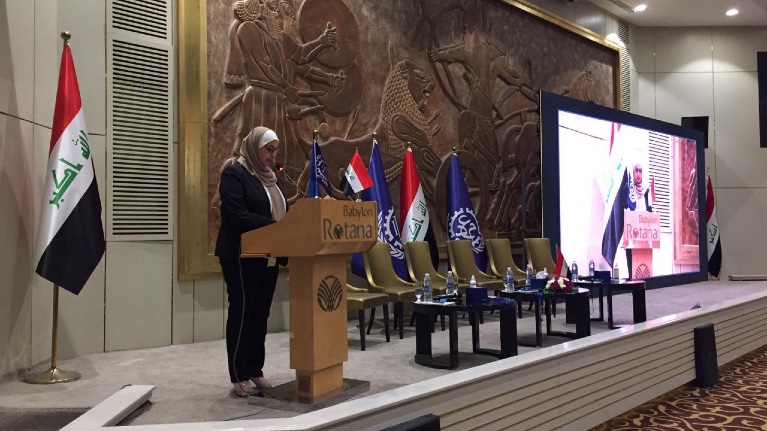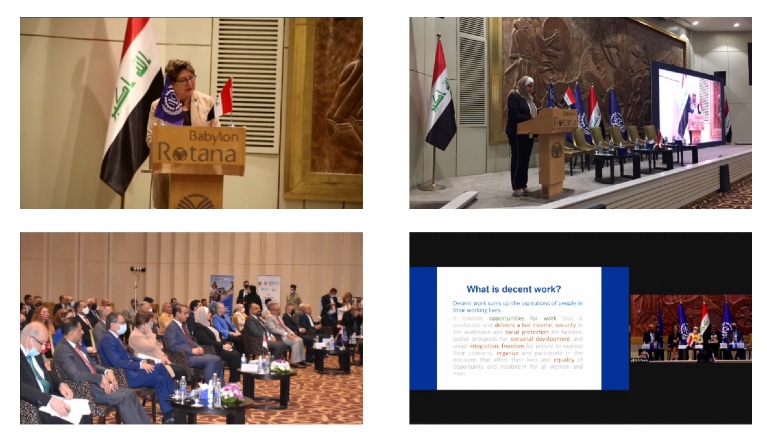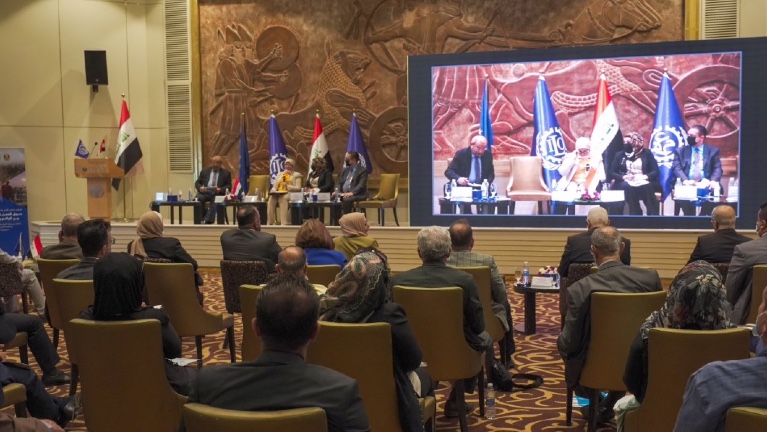Conference held by ILO and Ministry of Labour and Social Affairs highlights key labour market issues in Iraq
The conference, held under the patronage of the Prime Minister, brought together partners from across the spectrum, including representatives from the government, employers' and workers' organizations, key policymakers, UN agencies and development partners, as well as academics.
 © MOLSA
© MOLSAHeld Under the Patronage of His Excellency Prime Minister Mustafa al-Kadhimi, a conference entitled Iraq’s Labour Market: Realities and Aspiration, was organised by the Ministry of Labour and Social Affairs and the International Labour Organization.
It was attended by His Excellency Minister of Labour and Social Affairs, Dr. Adel Al-Rikabi, UN Deputy Special Representative and Resident Coordinator and Humanitarian Coordinator for Iraq, Ms. Irena Vojáčková-Sollorano, the Ambassador of the European Union to Iraq, His Excellency Mr. Martin Huth and ILO Country Coordinator for Iraq Dr. Maha Kattaa.
The conference also brought together experts and representatives from the government, employers' and workers' organizations of Iraq, key policymakers, UN agencies and development partners, as well as academics.
“One of the most important factors which contributes to peace is employment and the provision of decent work opportunities for Iraqis. The on-going unemployment situation is a serious challenge, which leads to an increase in violence and instability, hinders the creation of an environment that attracts investment, and increases social problems,” said Dr. Al-Rikabi. “We hope that, through you and through the efforts of the concerned parties, to work to restore the labour market of Iraq to its position, both nationally and internationally, and work to restore balance in the forces of the labour market and its various components, and stimulate investment to create more decent job opportunities."
The conference centred around four key sessions: labour market challenges and opportunities; the role of the private sector and investment in creating decent employment; active labour market policies and programmes; and the development of an integrated and comprehensive national employment policy.

“The UN in Iraq is actively contributing to both creation of decent jobs through its large-scale projects and to employment through the Sustainable Development Cooperation Framework. The Government of Iraq and its private sector are the key stakeholders for the long-term vision of this joint Cooperation Framework, which transforms humanitarian needs into long-term development goals. I am confident that today’s workshop will bring us one step closer to achieving these goals,” said Ms. Vojáčková-Sollorano.
The one-day event was an opportunity to discuss, exchange views and lessons learnt on key labour market issues guided by evidence-based research and programmes. It examined solutions to address the immediate needs of the country’s labour force, and ways to coordinate efforts that could better support the country’s most vulnerable workers. It also looked at medium and longer-term measures needed to better protect workers, such as those in informal employment and enterprises, such as small-scale businesses, so they can better cope especially during economic shocks, such as that brought about by the pandemic.

“The Covid-19 pandemic compounded by the economic crisis, has had a significant impact on the socio-economic well-being of all Iraqis, thereby highlighting the need for a comprehensive approach to the labour market in Iraq. As European Union, we are thus pleased to support together with our UN-partners the laudable efforts of the Iraqi Government for active labour market policies, labour governance and labour protection as laid out in the White Paper and specifically, the Decent Work Country Programme. Today’s first Iraqi Labour Conference has reassured me of the strong resolve of the Iraqi Government to take decisive action and I am looking forward to continuing our EU engagement with the Iraqi authorities,” Mr. Huth added.

“We need to agree on the most pressing issues facing the labour market in Iraq today and on ways to address them in a more effective and coordinated manner through our policies and programmes. From job creation to supporting workers through skills development, and promoting entrepreneurship through the establishment of small businesses, to facilitating access to public employment services and developing the private sector so it can create more and better jobs,” said Dr. Kattaa. “These programmes should be guided by a national employment strategy and a clear action plan implemented in close coordination with the government and our social partners.”
The conference concluded with an outline of key recommendations which were put forward through the various research and discussions which took place during the day. The recommendations will be presented and endorsed as a first step towards concrete action to enhance decent wok in Iraq’s labour market.